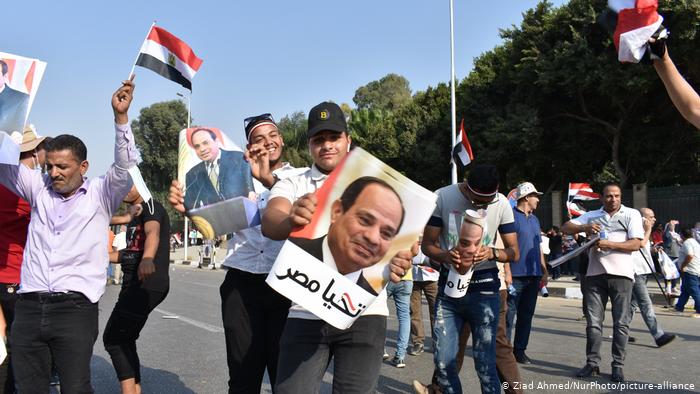Millions have begun voting in the Arab world’s most populous nation amid the coronavirus pandemic. The votes will likely lead to a House of Representatives packed with politicians loyal to President Abdel-Fattah el-Sissi.
Polls opened in Egypt on Saturday in the first stage of parliamentary elections which are set to be dominated by President Abdel-Fattah el-Sissi supporters.
Nearly 63 million voters out of Egypt's more than 100 million people are eligible to elect 568 of the 596 lawmakers in the lower house.
The first stage of voting covering 14 provinces will end on Sunday, followed by a second stage on November 7-8, covering 13 provinces including the capital, Cairo.
Run-offs will be held in late November and final results are executed in December.
Election authorities said face masks would be handed out to voters free of charge and that polling stations were disinfected. Officials also warned that those who boycott the vote could be fined up to 500 Egyptian pounds (€27, $32).
Egypt’s new parliament will be the second to convene under El-Sissi, a former army general-turned-president.
Top contenders
More than 4,500 candidates, who are widely seen as El-Sissi supporters, are competing for 284 of the 568 seats reserved for independents under Egypt’s new electoral law.
People on eight party lists are running for the remaining 284 seats. El-Sissi will name 28 lawmakers, equal to 5% of the total number of seats in the House of Representatives.
Critics say the 596-seat legislature acts little more than a rubber stamp for El-Sissi's policies.
The Unified National List political coalition group, led by the Mostakbal Watan, or Nation's Future party, is among the leading contenders.
The coalition has grown and become a strong political force in the country since El-Sissi entered office. In August, the party won nearly three-quarters of the seats in an election for Egypt’s Senate.
Rise to power
El-Sissi has been governing the North African country since 2014, muzzling any serious political opposition to his leadership. He took office after removing Islamist President Mohamed Morsi in a military coup following protests in June.
Egypt effectively banned protesters under a restrictive 2013 law, and a renewable state of emergency has been in place since 2017.
In recent years, authorities have intensified their crackdown on dissent, targeting Islamist political opponents, secular pro-democracy activists, journalists and online critics.
Latest Stories
-
Shamima Muslim urges youth to lead Ghana’s renewal at 18Plus4NDC anniversary
15 minutes -
Akufo-Addo condemns post-election violence, blames NDC
23 minutes -
DAMC, Free Food Company, to distribute 10,000 packs of food to street kids
2 hours -
Kwame Boafo Akuffo: Court ruling on re-collation flawed
2 hours -
Samuel Yaw Adusei: The strategist behind NDC’s electoral security in Ashanti region
2 hours -
I’m confident posterity will judge my performance well – Akufo-Addo
2 hours -
Syria’s minorities seek security as country charts new future
3 hours -
Prof. Nana Aba Appiah Amfo re-appointed as Vice-Chancellor of the University of Ghana
3 hours -
German police probe market attack security and warnings
3 hours -
Grief and anger in Magdeburg after Christmas market attack
3 hours -
Baltasar Coin becomes first Ghanaian meme coin to hit DEX Screener at $100K market cap
4 hours -
EC blames re-collation of disputed results on widespread lawlessness by party supporters
4 hours -
Top 20 Ghanaian songs released in 2024
4 hours -
Beating Messi’s Inter Miami to MLS Cup feels amazing – Joseph Paintsil
5 hours -
NDC administration will reverse all ‘last-minute’ gov’t employee promotions – Asiedu Nketiah
5 hours

